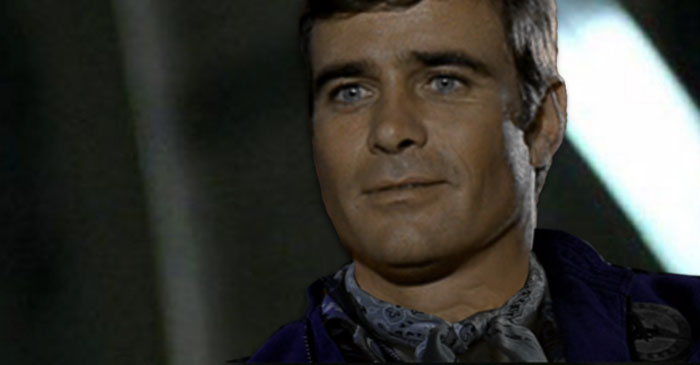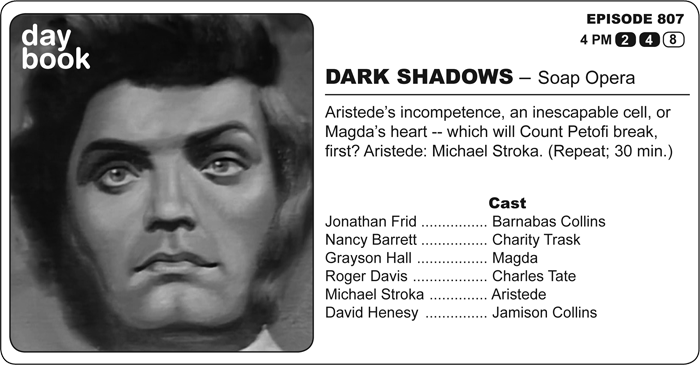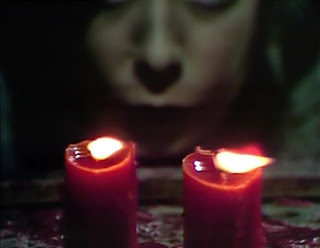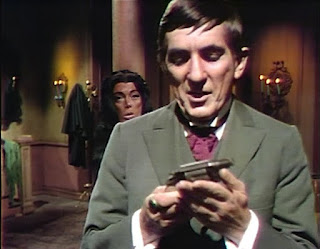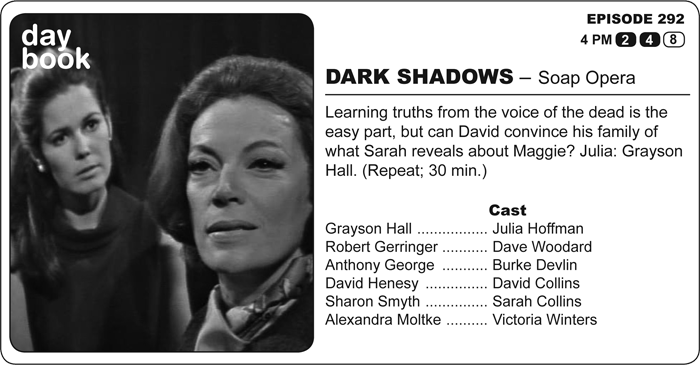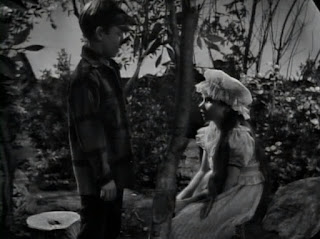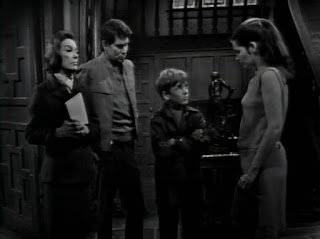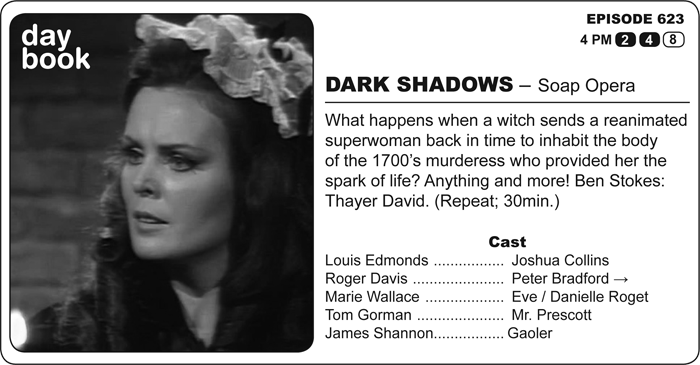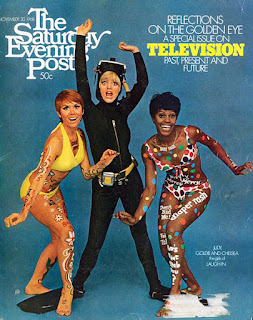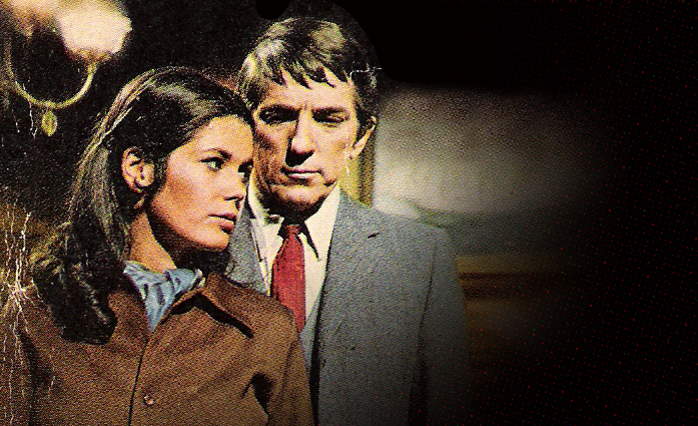In 1968, a writer for the
Saturday Evening Post spend a week on the New York City sets of DARK SHADOWS. The result was one of the most in-depth pieces written about the show during its prime, though there's still a great deal here that's sure to piss off fans. The tone wanders between
wry and
condescending, managing to be both honest and spiteful in equal doses. Despite all of this, writer George Fox never really breaks new ground in regards to understanding the appeal of the show. Fox does everyone a disservice by hitting the usual beats found in almost every story written about DARK SHADOWS. Still, it's an interesting read and might
still be controversial enough to prompt some discussion more than 40 years after it was originally published.
Note: Following the clues given in the story, it appears Fox was hanging around the DARK SHADOWS studios in May that year. The story was not published until November, around the same time that actor Robert Rodan left the series.
 Can a 172-Year-Old Vampire Find Love
and Happiness in a Typical New England Town?
By GEORGE FOX
The Saturday Evening Post
November, 1968
Can a 172-Year-Old Vampire Find Love
and Happiness in a Typical New England Town?
By GEORGE FOX
The Saturday Evening Post
November, 1968
In some ways the situation wasn't unusual for a soap opera. A girl and an older man in the process or eloping had been hurt in an auto accident. However, the condition of the still-unconscious male patient baffled the examining doctors at the hospital. Although he had suffered only a minor head wound and was breathing normally, his veins were almost empty of blood and no heartbeat or pulse could detected. The treatment — massive transfusions — was already under way when the patient's physician and a friend arrived at the emergency ward. "What do you think Will happen to him?" asked the friend in a desperate whisper. "Who can tell?" was the M.D.’s equally tense reply. "After all, no one's ever given massive blood transfusions to a vampire before."
A burst of eerie music is followed by a denture-adhesive commercial, and one more episode of ABC's "continuing suspense drama," Dark Shadows, comes to a cliff-hanging conclusion. "All soaps are basically problem shows," one of the writers says.”'Most deal with issues of tremendous interest to the American housewife. You know, abortion, adultery, adolescent rebellion, drug addiction, stuff like that. Our problem is 'Can Barnabas Collins, a 172-year-old vampire with a guilt complex, find love and happiness in a typical New England town?'"
Seen on ABC at 4 P.M. (E.S.T.) Monday through Friday. Dark Shadows is the top-rated daytime attraction. With females between the ages of 12 and 34. In recent months the show has become something of a national fad. Barnabas Collins board games, posters, Halloween costumes, masks, capes, coloring books and bubble-gum cards are being rushed on the market. One entrepreneur is even preparing Barnabas Collins plastic fangs, adjustable to any juvenile mouth.
Until the character of Barnabas was introduced last year, the program's darkest shadow of all was a cancellation notice lurking in the wings. Surveys made early in 1967 showed that it was being watched in only 2,750,000 homes, as against a whopping 4,480,000 today. The story had originated as a straight "soap" With Gothic trappings — an old dark house on the Maine coast; young governess menaced by unspecified evils, etc. Topping the cast was former movie actress Joan Bennett, the diminutive brunette whose more than 70 film roles had ranged George Arliss' niece in
DISRAELI to Elizabeth Taylor's mother in
FATHER OF THE BRIDE. "We were really bombing." admits Dan Curtis, the independent producer who packages the show, "so I figured, to hell with it. If I'm going to fail, I’ll at least have a good time. I went wild, tossed in witches and ghosts, you name it. But that vampire made the difference. Two weeks after he came on, the ratings began to climb.”
"That vampire" is, in reality, a 44-year-old Canadian actor named Jonathan Frid, a tall, attractively homely man with a face like a gardening trowel. I first met him in the Dark Shadows studio, a rancid-yellow structure the size of a two-story commercial garage. A warren of cramped dressing rooms and production offices — drenched with antiseptic pale light — fills the top floor. The effect is a little like being trapped in a submarine.
Frid was in full costume: black Inverness cape; long hair plastered down in spiked bangs; tombstone-white skin: large, slightly cruel gray eyes. He was asked if he had any personal theories on why his character had become such a success.
"To be frank, I haven't thought about it much," he said in his somber, dramatic voice. Paradoxically, his off-screen mannerisms — sweeping gestures, eyebrows arching almost to the hairline — are more florid than his acting style. Frid's vampire is restrained almost to the point of rigidity, as if fighting to hold himself back from some dark, nameless act. "There was the fan mail, of course," he went on. "It's up to two thousand letters a week now, mostly from women. They even send me nude pictures of themselves.
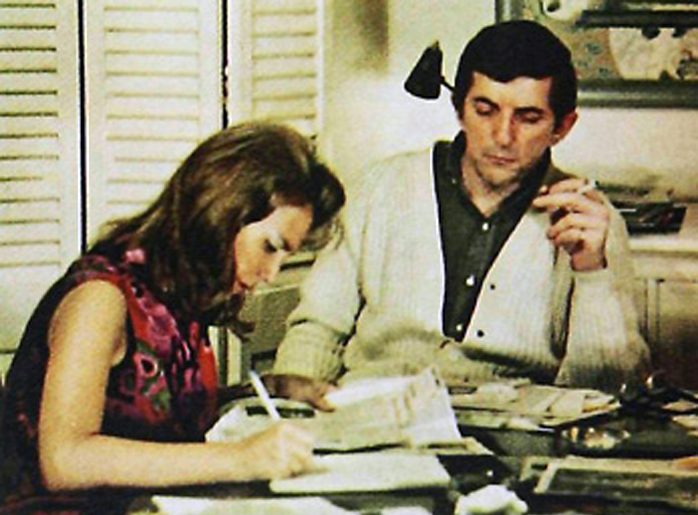 |
| "Frid works with a secretary to answer the thousands of letters that pour in each week -- most of them from admiring women." |
"I suppose women see Barnabas as a romantic figure because I play him as a lonely, tormented man rather than a Bela Lugosi villain. I bite girls in the neck, but only when my uncontrollable need for blood drives me to It. And I always feel remorseful later. In the story, I was murdered and turned into a vampire by a jealous witch back in 1796. Actually, my main interest is curing my condition. It's even happened occasionally, like the time I was given massive transfusions by mistake. They made me a normal human. Unfortunately, there was a side effect—I actually looked 172 years old. It was either bite girls in the neck again or die of old age …”
The scripts of Dark Shadows are tailored to make Barnabas Collins sympathetic in spite of his more antisocial tendencies. "He does terrible things," says Gordon Russell, one of the writers, "but we always give him a good reason.” An especially vivid example of this philosophy was the demise of the Reverend Mr. Trask. The episode took place during a flashback to the 18th century, detailing the hero's early career as a member of the living dead. The Reverend Mr. Trask, as it happened, was organizing a mass execution of suspected witches at the time. Emerging from his coffin one night. Barnabas learned of the enterprise and immediately denounced it as "superstitious nonsense " (How a man who had been turned a vampire by a witch could be certain the reverend's victims were innocent was never explained.) DARK SHADOWS fans cherish moment when Barnabas trapped the cleric in the basement of an abandoned house and hit him the haughty phrase: "l thought you were a pious hypocrite when I was alive, and I think you're a pious hypocrite now." He then proceeded to wall up Trask in an alcove.
"Dress rehearsal, dress rehearsal," screamed the loudspeaker in Frid's dressing room. "Personally, the success of the show hasn't meant all that much," he said, rising and brushing a spot of talcum powder off the collar of his cape. "l got a raise when I signed a two-year contract, but that's it. The trouble, I guess, is that soaps are rather subterranean. The people you want to impress are working while you're on. Somehow, this sort of thing just isn't real ...”
If Jonathan Frid can't quite come to grips with his offbeat celebrity, it's understandable. Born and raised in Hamilton, Ontario, trained in his craft at London’s Royal Academy and the Yale Drama School, he'd spent nearly two decades as one of the hundreds of New York-based actors who, somehow, just never make it. Respected by other professionals, they fill out the years between Broadway roles in regional theaters, touring with road companies, playing small parts in Shakespeare summer festivals. "l portrayed so many conspirators m Shakespeare's historical plays that even today my only real political allegiance is to the House of York,” Frid says. To find fame and relative fortune as a vampire in a soap opera, his manner hints, is improbable almost to the point of hallucination.
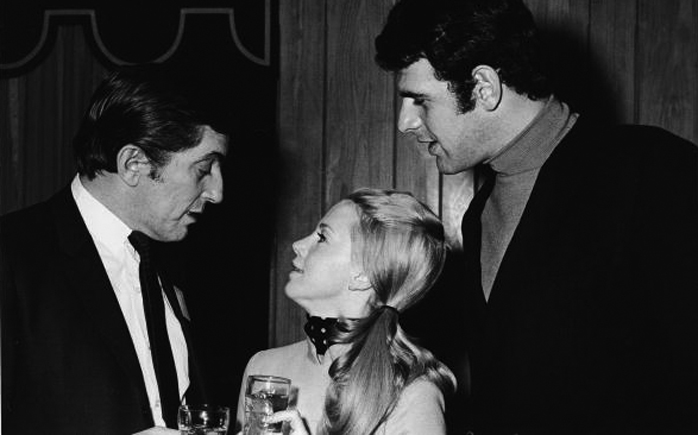 |
| Jonathon Frid, actress E.J. Peaker and Robert Rodan attend a party for the cast of DARK SHADOWS in 1968. |
Descending from the neat, sterile confines of the studio's second floor to the bustling, dusty clutter of the taping area is something of a shock. Because of limited space, sets are crammed in one upon another at unexpected angles. A single step takes you from the huge, murky living room of Collinwood — the house around which most of the action revolves — to a sunlit artist's studio, which in turn borders on an ancient graveyard. Through it all move technicians, wheeling their cameras like robot dance partners. The actors — who put in 9-10-11-hour days —sit in odd corners, memorizing their lines, oblivious of the activity around them. The show even has a late shift — stagehands who labor most of the night to erect the sets for the following day's program. The three-man writing staff works in an apartment about 10 blocks from the studio, struggling to keep the scripts at least two weeks ahead of the taping schedule.
The actors talk a lot about wages and working conditions. Daytime serials, some of winch have kept the same character for 18 years, are the closest thing to real job security an actor can find, although the 13-week option clauses add a certain amount of suspense. The week I watched the show, the action revolved around a Frankenstein-type monster, played by a young, six-foot-six-inch actor named Robert Rodan. The role required him to spend most of his time as an inanimate, stitched-together hulk lying on a lab table. Having just come from a talk with the show's writers, I remarked that they were planning to throw him off a cliff in a few months. He sat bolt upright. "Do I get killed?" he said.
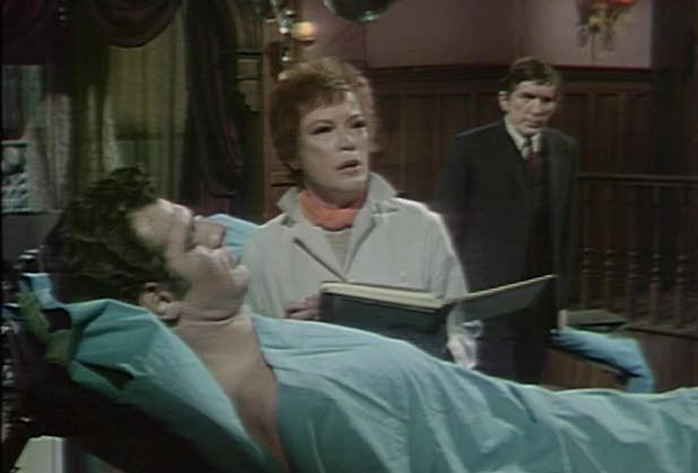 |
| Robert Rodan, Grayson Hall and Jonathan Frid. |
Other cast members are more casual about their labors. Redheaded Grayson Hall implied that her main reason for staying with the show is professional laziness. A gifted actress with a solid stage-and-screen reputation, she received an Academy Award nomination several years ago for her performance as a Lesbian schoolteacher in
NIGHT OF THE IGUANA. "I guess I could have gotten more Hollywood work, she said with an easy laugh, "but it meant living out there and going to the parties and everything. Movie people can't separate an actress from her role. To them I'm still the crazy dyke who chased Sue Lyon all over Mexico. Anyway, this show is comfortable and I get to work with my husband, who's one of the writers.
"I play Dr. Julia Hoffman, a kind of female mad scientist. She's one of the few people who know Barnabas is more than a harmless nut who hates sunlight. Actually, I’m in love with him, and I get jealous as hell because he bites young girls in the neck but refuses to bite me. Middle-aged housewives are always sending me letters saying they understand the situation perfectly."
The girl bitten most often Alexandra Moltke. She plays doe-eyed, virginal Victoria Winters, the show's original protagonist. With three more years to go on her five-year contract, boredom has set in. "Victoria is so dumb," she said with an exasperated grimace. "All I do is stand around saying, ‘I don’t understand what's happening.' Jonathan has hypnotized me into eloping with him, tried to cut off my boyfriend's head to stick on that goofy monster they made, even sent me hundreds of years Into the past during a séance. And I still haven't figured out that he may not be quite normal."
To Joan Bennett, who plays the reclusive mistress of Collinwood, the show is obviously a means of semi-retirement. Although still the only performer given "star" billing, she usually appears only twice a week, at her own request. “I hated the job at first," she admitted in her familiar, tartly suspicious tones. "All that getting up early and eating soup in a paper cup for lunch. But now I don’t mind. After all, poor Jonathan does most of the work. Isn't that amazing about him? Some of it has rubbed off on all of us. A month ago I was In the Midwest, narrating a fashion show, and the teeny-boppers just inundated me. I felt positively like a Beatle.”
Many parents forbid small children to watch the program, less because of the violence (gory scenes usually take place off camera) than because of its odd moral ambiguity. Barnabas is universally accepted by kids as the hero. Barnabas is universally accepted by kids as the hero. Some people apparently get nervous when their children identify with a character who bricks up living people in alcoves. This possibility was mentioned to producer Dan Curtis, a husky, ebullient ex-salesman with one of those suntans that must have been initiated in the cradle. He smiled tolerantly. "We have the only show on the air that kids can accept all the way as make-believe,” he said. "If you watch it regularly, you'll see what I mean. Nobody ever really dies. During the flashback to 1795, we killed off just about the whole cast — and as soon as we returned to 1968, there they there again as their own descendants. If we can't do that, we bring 'em back as ghosts or zombies."
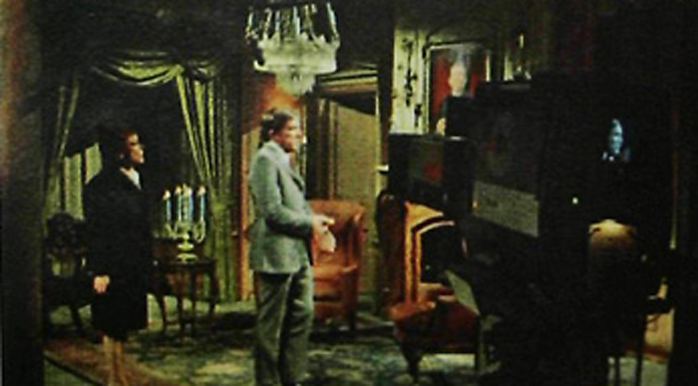 |
| "Frid, as Barnabas Collins, goes over a scene just as the day's shooting begins." |
Before leaving, I dropped by to say good-bye to Frid. During the four days I'd followed the shooting, he had been in virtually every scene, a feat requiring countless hours of rehearsal and memorization. "The worst part is that I'm a slow study," he said. "You can't always be looking at the TelePrompTer. The audience notices." Although the concept of DARK SHADOWS seems humorous in print, the actors — Frid, in particular — play it in an intense, realistic style. On Monday, after a weekend's rest, he had delivered his lines with energetic authority. By Thursday, the accumulated strain showed in slurred or misread speeches and ill-timed movements.
"I was awful today." he said. "We never retape, no matter how many fluffs the cast makes, not even when scenery falls over. Costs too much."
It was the first time I'd seen him without makeup, and he looked remarkably the same. His face was still pale and haggard, his eyes shadowed. He collapsed into an armchair. The excessively actorish mannerisms had disappeared, and abruptly I found myself talking to a shy, almost self-depreciating man. "This is the only time I really relax," he said, "when I know I'm not on the next day. You asked me earlier what direction I'd like my career to take, and I couldn't give you an answer. Actually I was trying to keep the day's lines straight in my head. Well, I’d like my own repertory company someplace. I've never been all that ambitious, though I enjoy being a big frog in little pond. The biggest kick I ever had as an actor was playing Richard Ill at a college in Pennsylvania. They really liked it, appreciated what I was trying to do. A show like this pays well enough, but— well, you know …”
As I left, I noticed a dozen or so teen-aged girls patiently waiting for Barnabas Collins to appear. I waved to them as I went out the door and, giggling, they waved back.
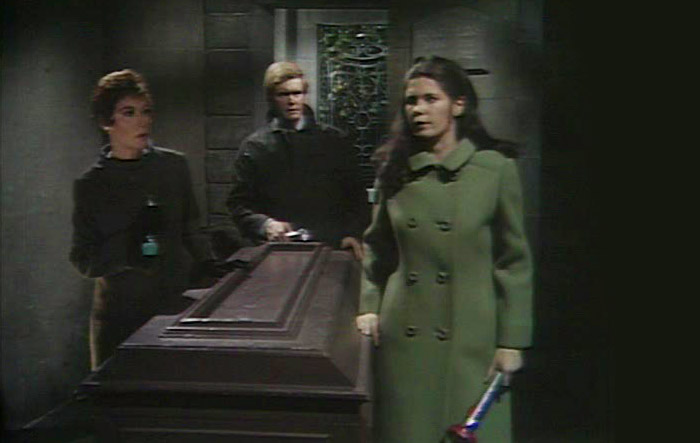
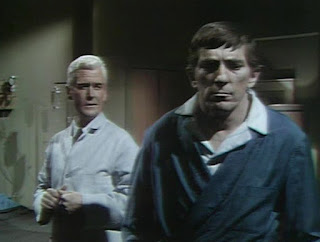 10% Last scene of the prior episode.
10% Last scene of the prior episode.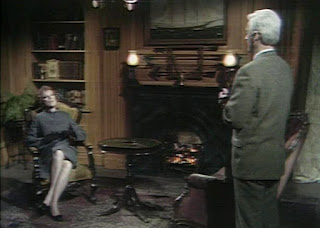 The hot scene in this one is the conversation that Julia has with Lang. This may be Julia’s real turning point. Up to this moment, Barnabas has been a thorn in her side that she’s niggled about to their mutual masochism. She’s poisoned him. Blackmailed him. Lang seems to sense this. He revels in pointing out the legitimate truth that he can care for Barnabas better than Julia. After all, he cured him in less than a day. It feels like two pimps arguing over an, um, employee. They both pretend to have his best interests at heart. They both pretend not to be engaged in vicious combat. One pretends not to be weaker. One pretends not to be gloating over it.
The hot scene in this one is the conversation that Julia has with Lang. This may be Julia’s real turning point. Up to this moment, Barnabas has been a thorn in her side that she’s niggled about to their mutual masochism. She’s poisoned him. Blackmailed him. Lang seems to sense this. He revels in pointing out the legitimate truth that he can care for Barnabas better than Julia. After all, he cured him in less than a day. It feels like two pimps arguing over an, um, employee. They both pretend to have his best interests at heart. They both pretend not to be engaged in vicious combat. One pretends not to be weaker. One pretends not to be gloating over it.
